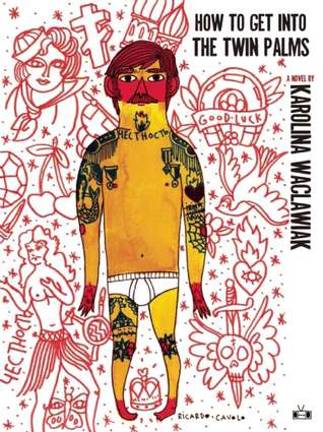The Protagonist: So You Want to Be a Novelist?

Karolina Waclawiak decided she was going to leave her Columbia University MFA with a novel. Waclawiak, who was born in Poland but had been living in Los Angeles, decided she needed to "work out [her] issues in an immigrant novel." She began querying agents at the end of her MFA program, but after 25 unsuccessful queries, thought she might be going about it the wrong way. The agents who did respond told her the protagonist of her novel,How to Get Into the Twin Palms,was "too unlikeable." "You have to do something to make this character likable," they said. "Make it a murder mystery." But Waclawiak was determined to find someone who would publish her book for what it was. Waclawiak figured it was time to go straight to the publishers instead. She began looking at small presses, particularly those that published books she already loved. Waclawiak drew up what she considered a pretty good query letter and again began the waiting process. Small, Ohio-based publishing house Two Dollar Radio finally reached out to Waclawiak -- they wanted to publish her debut novel. Two Dollar Radio runs on an open manuscript submission process and you don't need a literary agent to publish with them. Their motto is "Books Too Loud to Ignore." Emily Pullen, who works for Two Dollar Radio, said one thing they look for is writers with authority over the worlds they create. When working with writers on edits, Pullen said she's more inclined to ask questions to get the author thinking than make suggestions. The whole process works a little bit like a drawn-out psychoanalysis session. Small presses tend to "do more interesting things," according to Pullen and Waclawiak. Once Two Dollar Radio decided to publish Waclawiak's book, the agents began calling. Waclawiak's advice for other first-time novelists -- or writers of any genre -- can be distilled into a couple key points. If you're in love with your book the way it is, consider bypassing the agent process. Agents can be helpful, but they also look for very specific things and may request changes you feel compromise the integrity and authenticity of your work. Be confident and creative about getting your manuscript out there. Look for small presses with open submission policies and contact publishers directly. Large publishers might not take unsolicited manuscripts, so look to small presses if you're not getting anywhere with literary agents. Even if agents tear your book apart, that doesn't mean it's terrible. It's still possible others will love it, and, furthermore, it's still possible to be entertained by unlikeable characters. Think about your audience and realize it's not going to be everyone. Don't write for anyone specifically (other than yourself). Have patience. The timeframe between acquiring a book and publishing for a small press can be up to two years, but the timeframe is even longer at a major publishing house. Consider your book cover carefully. Even if you think it's too off-the-wall, for instance, it might be just the draw reviewers need to pick up your book and review it. (Even small publishers get great review attention.) Again, get creative. Reach out to sellers directly to extend your exposure. Use Twitter to your advantage, but be a person with an organic approach, and not a sleazy, self-promoting robot. Talk to authors, bookstores and bloggers. Develop relationships. Look to online communities of book-lovers, like Goodreads. Get involved with reading series and book clubs. Be a real person. Publishers recommend books when they have positive associations with the author, not just when they like the book. Self-publishing is an option, but publishers provide an often much-needed outside perspective. You may be too close to your own work and can get more with someone else's expertise -- from within the industry -- or editorial eye. Small publishers don't tend to feel betrayed when an author moves on -- they know that's the name of the game. Small presses have limitations. Small presses also come in all different shapes and sizes, with varying rates of distribution. Look to a resource like [Poets & Writers](http://www.pw.org/) to find publishers. Keep at it. Be open to suggestions. Kill your darlings, but don't go too extreme. Know yourself and your limits. It's okay to not be universally awesome, and sometimes it's better to experience the love-hate extremes. According to Waclawiak, many of her MFA peers hated her manuscript. If you want it badly enough, you'll figure it out. Keep your day job...for now. -Alissa Fleck